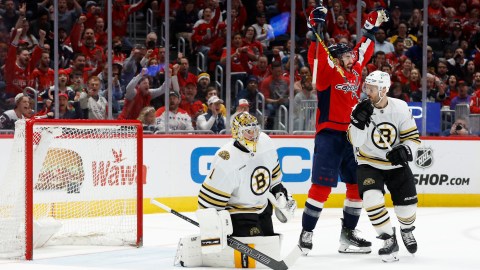Editor's note: Neil Fielder is a member of NESN's production team and contributed this story to NESN.com.
Ever wonder where that voice comes from? You know, the big voice on all the NESN promos you love so much? Meet Joey Pepin. He is a professional voice actor.
NESN.com: How did you get started?
Joey Pepin: I was watching the Olympics one time and that guy with the iconic voice of the Visa commercials where he says, "Visa, it's everywhere you want to be." I thought, I want to do that. I don't even know what that is, but I want to do that, it sounds cool.
NESN.com: Are you a sports fan?
JP: Oh yes, huge sports fan — well I'm a football and baseball fan. I'm a big American League baseball fan.
NESN.com: How much can you make?
JP: If you're only doing union commercial work, and only doing bookings through your New York or L.A. agent, you can make a ton of money. I think the union rate for a 30-second commercial is, like $350 plus residuals, plus however many markets it gets bought. So a typical session that lasts you an hour you can make anywhere from $300-400 to a few thousand depending on how big the buy is. It's even harder to say what is typical because, it just depends. One year you can make six figures, living large and feeling like everything is great and the next year you can only have booked a few things and scraping by. Those who are fortunate enough to have steady work can make a pretty good living.
And there are those who don't ever go even after that high dollar, they will go after what we call the "dollar holler spots." You can make a pretty good living, but you're working all the time and you're putting yourself out there and being that typical radio announcer. The sales stuff that doesn't make that much money, but if you're working all the time you can make some money.
Voiceover is weird. There is a lot of camaraderie among the voice actors but at the same time, there is a lot of, I don't know if I would say, animosity or jealousy but you know, it's hard to hear a commercial and wonder 'Why did they pick him and not me?' (or) 'Why is so-and-so making all this money and I'm not?'
I would say at this point in my career, in my life, I feel fortunate to make a good living doing what I'm doing. I wouldn't have thought I could make this much money from home, doing what I love when I was younger.
NESN.com: Any advice for someone pursuing a career in voiceover?
JP: Studying English. What our job is as voice actors is to try to bring the writers' copy to life. To try and understand the intent of the writer, and if you can understand what the writer is trying to say, and if you can convey it the way they are thinking in their head you have a big advantage.
It was a big surprise to me when I learned coming out of radio trying to get into voiceover that it's not about the voice. You think, wow, you've got a good voice you should do voiceover. Well I've got pretty steady hands. That doesn't mean I can be a doctor.
Develop a thick skin, take some acting classes, understand English and keep at it. A lot of people in this industry they don't really make any good money until they've been doing it a while. I think a lot of the people who make big dough are in their fifties — they've been doing it for a long time, they've put the time, they've paid their dues sort of speak, and they've got so much practice at it, that it comes easier. Amazing to think it's actually hard work, but it is.
NESN.com: How is the industry changing?
JP: The latest buzz has to do with the economy, I think there is a smaller pie, and there are more people trying to get their slice of pie. It used to be that no one had even heard of being a voice actor or even tried but now there are websites and companies designed to help you break into voiceover, you know classes you can take for the beginner. There are some that fear that it's diluting the pool. It's my opinion that it only raises the stature of the pros who have been doing it for a while. The difference between somebody who does it for a living everyday on a high level versus somebody who just took a class and bought a USB mic is huge.
NESN.com: What are the strengths and weaknesses of your voice?
JP: That is a big key to being successful in voiceover is knowing what your strengths and weaknesses are. If you don't sound like a typical trailer guy, it's pretty obvious what type of voice they're looking for — that deep very sinister sort of dark — whenever I do it, it sounds a little forced, so not really my strength.
Everyday guy. That's pretty much strength of mine. Sports promos, sometimes when we get into the Bruins stuff and it's a little deeper, it works really well I think, that's a strength of mine.
And maybe it's hard to believe from what you hear on the air, but character voices are a big strength of mine, I've always been a goofball making silly voices, and I book a lot of really weird things. I was the voice of Curious George on a toy a while back, because I could sound like a laughing monkey. So you go from Bruins on NESN to (laughs like a monkey) so that one was pretty weird. And the direction was really weird, too. One of the producers there was like, "Can you give me a little more of a happier monkey laugh because you almost sound like a sinister evil monkey?" OK, yes sir, I am a happy monkey.
To hear examples of Pepin's voiceovers, check out the video below.



